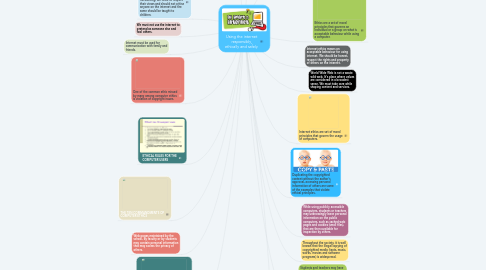Using the internet responsibly, ethically and safely.
저자: Matthew Ajero

1. One of the common ethic missed by many among computer ethics is violation of copyright issues.
2. Plagiarism is one of the major forms of academic dishonesty which has always existed in education, including higher education.
3. The computers that are used by student or teachers may contain software that allow files from computer accessible to other users on the campus network and outside without knowledge of the owner.
4. Web pages maintained by the school, by faculty or by students may contain personal information that may access the privacy of others.
5. THE TEN COMMANDMENTS OF COMPUTER ETHICS
6. ETHICAL RULES FOR THE COMPUTER USERS
7. Internet must be used for communication with family and friends.
8. We must not use the internet to pretend as someone else and fool others.
9. We must not use rude or bad language while using email, chatting, blogging and social networking, we need to respect their views and should not critise anyone on the internet and the same should be taught to children.
10. We should teach children not to give personal details like home address, phone numbers, interests, passwords to anyone
11. While using publicly accessible computers, students or teachers may unknowingly leave personal information on the public computers, such as cached web pages and cookies (small files), that are then available for inspection by others.
12. Ethics are a set of moral principles that governs an individual or a group on what is acceptable behaviour while using a computer.
13. Internet ethics are set of moral principles that govern the usage of computers.
14. Duplicating the copyrighted content without the author's approval, accessing personal information of others are some of the examples that violate ethical principles.
15. Throughout the society, it is well known that the illegal copying of copyrighted media (texts, music, works, movies and software programs) is widespread.
16. Students and teachers may have authorised access to computer resources, but then go on to use these resources improperly. They may have a school/library Internet account, or they may use computer system, network or software that is owned by the school and do so in a way that does not meet the school's standards for proper use of that particular resource.
17. Internet ethics means an acceptable behaviour for using internet. We should be honest, respect the rights and property of others on the internet.
18. World Wide Web is not a waste wild web. It's place where values are considered in a broadest sense. We must take care while shaping content and services.
19. You should know what children are doing on the internet and the sites they visit on the internet and should check with whom they are communicating.
20. We must encourage children, students and others to gain the knowledge from the internet and use it wisely.


